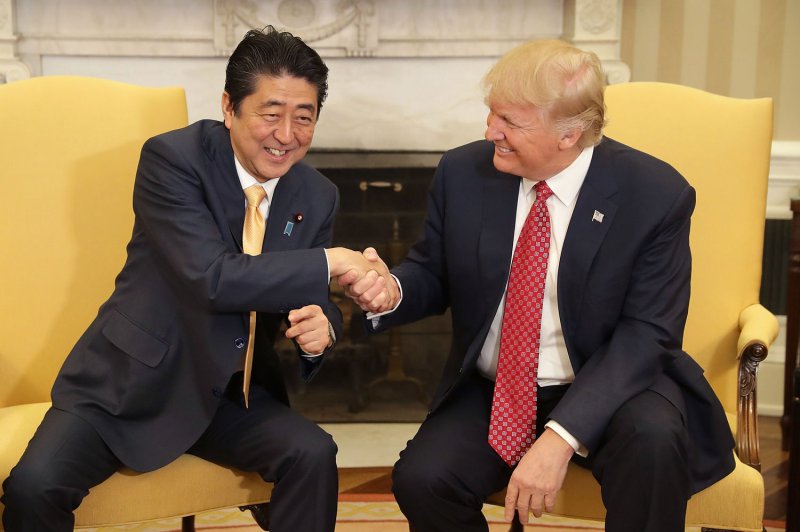U.S. President Donald Trump (R) and Japanese Prime Minister Shinzo Abe shake hands before bilateral meetings in the Oval Office at the White House on February 10. Pool Photo by Chip Somodevilla/UPI |
License Photo
NEW YORK, Oct. 5 (UPI) -- U.S. President Donald Trump has dramatically shifted the psychology of U.S. businesses leaders and households on how to make the economy "great" again, experts said, but his "obsession" with trade deficits, particularly with Asian trading partners like Japan, may need to be evaluated differently.
Columbia University economist Glenn Hubbard, who served as chairman of the Council of Economic Advisers under former President George W. Bush, said Wednesday in New York he credits Trump with a "willingness to call out [trade] practices that are in fact unfair."
But Hubbard said he is critical of punishing key U.S. partners for trade deficits, particularly when a nation's overall trade position has more to do with savings and investment.
"The real source of my disappointment is that the president isn't tackling policies that will help the people affected by trade," the Columbia Business School dean said, adding policies that will "radically rethink" labor market institutions and low-wage work are what's needed.
Speaking at the Japan Society, Hubbard also suggested Trump could have done better than "punish the United States by withdrawing from the Trans-Pacific Partnership."
Trump abandoned the deal soon after assuming office.
Asia-Pacific leaders party to the deal have since then vowed to move forward with the agreement without the United States, with Australia's Malcolm Turnbull suggesting that China replace the United States.
Koichi Hamada, economic adviser to Japanese Prime Minister Shinzo Abe, described protectionist policies as "irrational" and suggested the rise of artificial intelligence and mobile app-enabled businesses like Uber, are providing a new dimension on how to achieve productivity in post-industrial economies while undercutting labor.
Hamada did not suggest a solution to the rise of AI and its impact on low-wage workers, but high productivity is a top priority, he said.
"You can't project a lot of hard power in the world if you don't have a lot of money," Hubbard said in agreement. "High productivity growth economies are the ones that can afford defense. At the root the economy remains important."
That point could play a role in future U.S. negotiations with allies like Japan and South Korea that will need to grow in order to strengthen its defense capabilities.
In September, Trump said in a tweet he would allow South Korea and Japan to purchase additional military equipment from the United States following the detonation of what North Korea claimed to be its most powerful hydrogen bomb.
"I am allowing Japan & South Korea to buy a substantially increased amount of highly sophisticated military equipment from the United States," Trump tweeted.
But Hamada said any escalation of threats risks lives in Northeast Asia.
"Brinkmanship has to be done very carefully," Hamada said. "North Korea directly affects lives in Japan, Korea."















